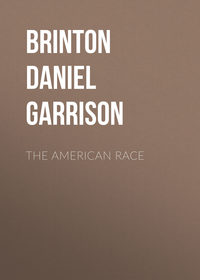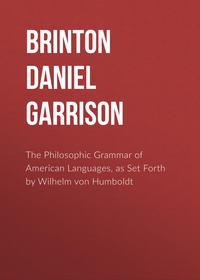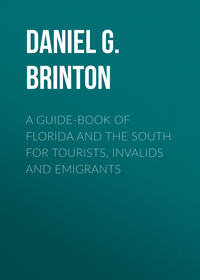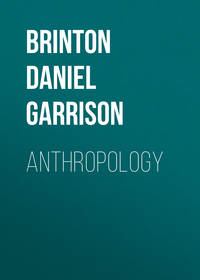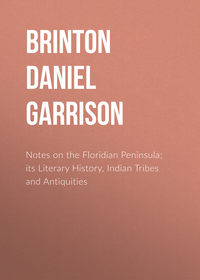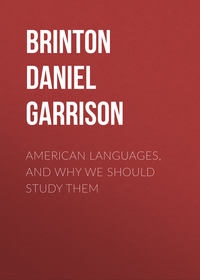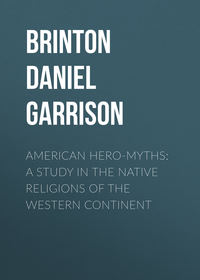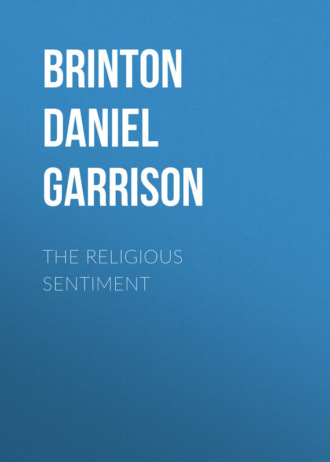 полная версия
полная версияThe Religious Sentiment
(3.) The closer defining of life as a result of physical force, and the recognition of mind as a connotation of organism, promise to be active in elevating religious conceptions, but at the expense of the current notions of personality. Sensation and voluntary motion are common to the fetus, the brute and the plant, as well as to man. They are not part of his “soul.” Intellect and consciousness, as I have shown, exclude sensation, and in these, if anywhere, he must look for his immortal part. Even here, error works destruction, and ignorance plants no seed of life. We are driven back to the teaching of Buddha, that true thought alone is that which does not die.
Why should we ask more? What else is worth saving? Our present personality is a train of ideas base and noble, true and false, coherent through the contiguity of organs nourished from a common center. Another personality is possible, one of true ideas coherent through conscious similarity, independent of sensation, as dealing with topics not commensurate with it. Yet were this refuge gained, it leaves not much of the dogma that every man has an indestructible conscious soul, which will endure always, no matter what his conduct or thoughts have been. Rather does it favor the opinion expressed so well by Matthew Arnold in one of his sonnets:
“He who flagged not in the earthly strifeFrom strength to strength advancing – only he,His soul well knit and all his battles won,Mounts, and that hardly, to eternal life.”Not only has the received doctrine of a “soul,” as an undying something different from mind and peculiar to man, received no support from a closer study of nature, – rather objections amounting to refutation, – but it has reacted injuriously on morals, and through them on religion itself. Buddha taught that the same spark of immortality exists in man and brute, and actuated by this belief laid down the merciful rule to his disciples: “Do harm to no breathing thing.” The apostle Paul on the other hand, recognizing in the lower animals no such claim on our sympathy, asks with scorn: “Doth God care for oxen?” and actually strips from a humane provision of the old Mosaic code its spirit of charity, in order to make it subserve a point in his polemic.
(4.) As the arrogance of the race has thus met a rebuke, so has the egotism of the individual. His religion at first was a means of securing material benefits; then a way to a joyous existence beyond the tomb: the love of self all the time in the ascendant.
This egoism in the doctrine of personal survival has been repeatedly flung at it by satirists, and commented on by philosophers. The Christian who “hopes to be saved by grossly believing” has been felt on all hands to be as mean in his hope, as he is contemptible in his way of attaining it. To center all our religious efforts to the one end of getting joy – however we may define it – for our individual selves, has something repulsive in it to a deeply religious mind. Yet that such in the real significance of the doctrine of personal survival is granted by its ablest defenders. “The general expectation of future happiness can afford satisfaction only as it is a present object to the principle of self-love,” says Dr. Butler, the eminent Lord Bishop of Durham, than whom no acuter analyst has written on the religious nature of man.
Yet nothing is more certain than that the spirit of true religion wages constant war with the predominance or even presence of selfish aims. Self-love is the first and rudest form of the instinct of preservation. It is sublimed and sacrificed on the altar of holy passion. “Self,” exclaims the fervid William Law, “is both atheist and idolater; atheist, because it rejects God; idolater, because it is its own idol.” Even when this lowest expression of the preservative instinct rises but to the height of sex-love, it renounces self, and rejoices in martyrdom. “All for love, or the world well lost,” has been the motto of too many tragedies to be doubted now. By the side of the ancient Roman or the soldier of the French revolution, who through mere love of country marched joyously to certain death from which he expected no waking, does not the martyr compare unfavorably, who meets the same death, but does so because he believes that thereby he secures endless and joyous life? Is his love as real, as noble, as unselfish?
Even the resistless physical energy which the clear faith in the life hereafter has so often imparted, becomes something uncongenial to the ripened religious meditation. Such faith brings about mighty effects in the arena of man’s struggles, but it does so through a sort of mechanical action. An ulterior purpose is ahead, to wit, the salvation of the soul, and it may be regarded as one of the best established principles of human effort that every business is better done, when it is done for its own sake, out of liking for it, than for results expected from it.
Of nothing is this more just than religion. Those blossoms of spiritual perfection, the purified reason, the submissive will, the sanctifying grace of abstract ideas, find no propitious airs amid the violent toil for personal survival, whether that is to be among the mead jugs of Valhalla, the dark-eyed houris of Paradise, or the “solemn troops and sweet society” of Christian dreams. Unmindful of these, the saintly psyche looks to nothing beyond truth; it asks no definite, still less personal, end to which this truth is to be applied; to find it is to love it, and to love it is enough.
The doctrine I here broach, is no strange one to Christian thought. To be sure the exhortation, “Save your soul from Hell,” was almost the sole incentive to religion in the middle ages, and is still the burden of most sermons. But St. Paul was quickened with a holier fire, that consumed and swept away such a personal motive, when he wrote: “Yea, I could wish that I myself were cast out from Christ as accursed, for the sake of my brethren, my kinsmen according to the flesh.”178 St. Augustine reveals the touch of the same inspiration in his passionate exclamation: “Far, O Lord, far from the heart of thy servant be it that I should rejoice in any joy whatever. The blessed life is the joy in truth alone.”179 And amid the pæans to everlasting life which fill the pages of the De Imitatione Christi, the medieval monk saw something yet greater, when he puts in the mouth of God the Father, the warning: “The wise lover thinks not of the gift, but of the love of the giver. He rests not in the reward, but in Me, beyond all rewards.”180 The mystery of great godliness is, that he who has it is as one who seeking nothing yet finds all things, who asking naught for his own sake, neither in the life here nor yet hereafter, gains that alone which is of worth in either.
Pressed by such considerations, the pious Schleiermacher threw down the glaive on the side of religion half a century ago when he wrote: “Life to come, as popularly conceived, is the last enemy which speculative criticism has to encounter, and, if possible, to overcome.” The course he marked out, however, was not that which promises success. Recurring to the austere theses of Spinoza, he sought to bring them into accord with a religion of emotion. The result was a refined Pantheism with its usual deceptive solutions.
What recourse is left? Where are we to look for the intellectual moment of religion in the future? Let us review the situation.
The religious sentiment has been shown to be the expression of unfulfilled desire, but this desire peculiar as dependent on unknown power. Material advantages do not gratify it, nor even spiritual joy when regarded as a personal sentiment. Preservation by and through relation with absolute intelligence has appeared to be the meaning of that “love of God” which alone yields it satisfaction. Even this is severed from its received doctrinal sense by the recognition of the speculative as above the numerical unity of that intelligence, and the limitation of personality which spiritual thought demands. The eternal laws of mind guarantee perpetuity to the extent they are obeyed – and no farther. They differ from the laws of force in that they convey a message which cannot be doubted concerning the purport of the order in nature, which is itself “the will of God.” That message in its application is the same which with more or less articulate utterance every religion speaks – Seek truth: do good. Faith in that message, confidence in and willing submission to that order, this is all the religious sentiment needs to bring forth its sweetest flowers, its richest fruits.
Such is the ample and satisfying ground which remains for the religion of the future to build upon. It is a result long foreseen by the clearer minds of Christendom. One who more than any other deserves to be classed among these writes: “Resignation to the will of God is the whole of piety. * * * Our resignation may be said to be perfect when we rest in his will as our end, as being itself most just and right and good. Neither is this at bottom anything more than faith, and honesty and fairness of mind; in a more enlarged sense, indeed, than these words are commonly used.”181
Goethe, who studied and reflected on religious questions more than is generally supposed, saw that in such a disposition of mind lie the native and strongest elements of religion. In one of his conversations with Chancellor Müller, he observed: “Confidence and resignation, the sense of subjection to a higher will which rules the course of events but which we do not fully comprehend, are the fundamental principles of every better religion.”182
By the side of two such remarkable men, I might place the opinion of a third not less eminent than they – Blaise Pascal. In one part of his writings he sets forth the “marks of a true religion.” Sifted from its physical ingredients, the faith he defines is one which rests on love and submission to God, and a clear recognition of the nature of man.
Here I close these studies on the Religious Sentiment. They show it to be a late and probably a final development of mind. The intellect first reaches entire self-consciousness, the emotions first attain perfection of purpose, when guided by its highest manifestation. Man’s history seems largely to have been a series of efforts to give it satisfaction. This will be possible only when he rises to a practical appreciation of the identity of truth, love and life.
1
In his essay entitled, Ueber den Geschlechtsunterschied und dessen Einfluss auf die organische Natur, first published in 1795.
2
“Der alte Dualismus von Geist und Körper, der Jahrhunderte hindurch nach Versöhnung gerungen, findet diese heute nicht zwar in der Einheit der Substanz, wohl aber in der Einheit des Gesetzes.” Dr. Heinrich Boehmer, Geschichte der Entwickelung der Naturwissenschaftlichen Weltanschauung in Deutschland, s. 201 (Gotha, 1872).
3
Elements of Physio-Philosophy, § 3589. Eng. trans., London, 1847.
4
Von Feuchtersleben, The Principles of Medical Psychology, p. 130 (Eng. trans., London, 1847).
5
“The fundamental property of organic structure is to seek what is beneficial, and to shun what is hurtful to it.” Dr. Henry Maudsley, Body and Mind, p. 22.
“The most essential nature of a sentient being is to move to pleasure and from pain.” A. Bain, On the Study of Character, p. 292 (London, 1861).
“States of Pleasure are connected with an increase, states of Pain with an abatement of some or all of the vital functions.” A. Bain, Mind and Body, p. 59.
“Affectus est confusa idea, quâ Mens majorem, vel minorem sui corporis, vel alicujus ejus partis, existendi vim affirmat.” Spinoza, Ethices, Lib. III. ad finem.
6
The extension of the mechanical laws of motion to organic motion was, I believe, first carried out by Comte. His biological form of the first law is as follows: “Tout état, statique ou dynamique, tend à persister spontanément, sans aucune altération, en resistant aux perturbations extérieures.” Système de Politique Positive, Tome iv. p. 178. The metaphysical ground of this law has, I think, been very well shown by Schopenhauer to be in the Kantian principle that time is not a force, nor a quality of matter, but a condition of perception, and hence it can exert no physical influence. See Schopenhauer, Parerga und Paralipomena, Bd. II, s. 37.
7
“Aller Genuss, seiner Natur nach, ist negativ, d. h., in Befreiung von einer Noth oder Pein besteht.” Parerga und Paralipomena. Bd. II, s. 482.
8
“No impression whatever is pleasant beyond the instant of its realization; since, at that very instant, commences the change of susceptibility, which suggests the desire for a change of impression or for a renewal of that impression which is fading away.” Dr. J. P. Catlow, The Principles of Aesthetic Medicine, p. 155 (London, 1867).
“Dum re, quem appetamus fruimur, corpus ex ea fruitione novam acquirat constitutionem, á quá aliter determinatur, et aliæ rerum imagines in eo excitantur,” etc. Spinoza, Ethices, Pars III, Prop. lix.
9
“Feeling and thought are much more real than anything else; they are the only things which we directly know to be real.” – John Stuart Mill. —Theism, p. 202. How very remote external objects are from what we take them to be, is constantly shown in physiological studies. As Helmholtz remarks: “No kind and no degree of similarity exists between the quality of a sensation, and the quality of the agent inducing it and portrayed by it.” —Lectures on Scientific Subjects, p. 390.
10
The Philosophy of Consciousness, p. 72.
11
The Gospel of John (ch. xviii.) leaves the impression that Pilate either did not wait for an answer but asked the question in contempt, as Bacon understood, or else that waiting he received no answer. The Gospel of Nicodemus, however, written according to Tischendorf in the second century, probably from tradition, gives the rest of the conversation as follows: “Pilate says to him: What is truth? Jesus says: Truth is from heaven. Pilate says: Is not there truth upon earth? Jesus says to Pilate: See how one who speaks truth is judged by those who have power upon earth!” [ch. iii.]
12
The most acute recent discussion of this subject is by Helmholtz, in his essay entitled, “Recent Progress in the Theory of Vision.”
13
George Boole, Professor of Mathematics in Queen’s College, Cork, was born Nov. 2, 1815, died Dec. 8, 1864. He was the author of several contributions to the higher mathematics, but his principal production is entitled: An Investigation into the Laws of Thought, on which are founded the mathematical Theories of Logic and Probabilities [London, 1854.] Though the reputation he gained was so limited that one may seek his name in vain in the New American Cyclopedia [1875], or the Dictionnaire des Contemporains [1859], the few who can appreciate his treatise place the very highest estimate upon it. Professor Todhunter, in the preface to his History of the Theory of Probabilities, calls it “a marvellous work,” and in similar language Professor W. Stanley Jevons speaks of it as “one of the most marvellous and admirable pieces of reasoning ever put together” (Pure Logic, p. 75). Professor Bain, who gives a synopsis of it in his Deductive Logic, wholly misapprehends the author’s purpose, and is unable to appraise justly his conclusions.
14
The Institutes of Metaphysic, p. 459, (2nd edition.)
15
An Outline of the Necessary Laws of Thought, p. 113 (New York, 1860).
16
The Dhamapada, verse 93.
17
Koppen, Der Buddhismus, s. 30.
18
Spencer in assuming an “unknowable universal causal agent and source of things,” as “the nature of the power manifested in phenomena,” and in calling this the idea common to both religion and “ideal science,” fell far behind Comte, who expressed the immovable position, not only of positive science but of all intelligence, in these words: “Le véritable esprit positif consiste surtout à substituer toujours l’étude des lois invariables des phénomènes à celles de leurs causes proprement dites, premières ou finales, en un mot la determination du comment à celle du pourquoi.” —Systèmede Politique Positive, i. p. 47. Compare Spencer’s Essay entitled, “Reasons for dissenting from Comte.” The purposive law is the only final cause which reason allows. Comte’s error lay in ignoring this class of laws.
19
The Institutes of Metaphysic, 2d Ed. See also Bain, The Emotions and the Will, the closing note.
20
Boole, Laws of Thought, p. 401.
21
Address to the Clergy, pp. 42, 43, 67, 106, etc.
22
E. von Hardenberg [Novalis], Werke, s. 364.
23
Treatises Devotional and Practical, p. 188. London, 1836.
24
In Aramaic dachla means either a god or fear. The Arabic Allah and the Hebrew Eloah are by some traced to a common root, signifying to tremble, to show fear, though the more usual derivation is from one meaning to be strong.
25
“Wen die Hoffnung, den hat auch die Furcht verlassen.” Arthur Schopenhauer, Parerga und Paralipomena. Bd. ii. s. 474.
26
Alexander Bain, On the Study of Character, p. 128. See also his remarks in his work, The Emotions and the Will, p. 84, and in his notes to James Mill’s Analysis of the Mind, vol. i., pp. 124-125.
27
Wilhelm von Humboldt’s Gesammelte Werke, Bd. vii., s. 62.
28
De Senancourt, Obermann, Lettre xli.
29
Elements of Medical Psychology, p. 331.
30
Lessing’s Gesammelte Werke. B. ii. s. 443 (Leipzig, 1855).
31
See Exodus, xxiii. 12; Psalms, lv. 6; Isaiah, xxx. 15; Jeremiah, vi. 16; Hebrews, v. 9. So St. Augustine: “et nos post opera nostra sabbato vitæ eternæ requiescamus in te.” Confessionum Lib. xiii. cap. 36.
32
“Filioli, diligite alterutrum.” This is the “testamentum Johannis,” as recorded from tradition by St. Jerome in his notes to the Epistle to the Galatians.
33
Alexander Bain, The Senses and the Intellect, Chap. I.
34
A Christian Directory. Part I. Chap. III.
35
“The very nature of affection, the idea itself, necessarily implies resting in its object as an end.” Fifteen Sermons by Joseph Butler, late Lord Bishop of Durham, Preface, and p. 147 (London, 1841).
36
Dr. J. Milner Fothergill, Journal of Mental Science, Oct. 1874, p. 198.
37
The most recent work on the topic is that of Messrs. Westropp and Wake, The Influence of the Phallic Idea on the Religions of Antiquity, London, 1874.
38
Schoolcraft’s History and Statistics of the Indian Tribes, Vol. iv. p. 224.
39
Richardson, Arctic Expedition, p. 412.
40
Most physicians have occasion to notice the almost entire loss in modern life of the instinctive knowledge of the sex relation. Sir James Paget has lately treated of the subject in one of his Clinical Lectures (London, 1875).
41
Dr. J. P. Catlow, Principles of Aesthetic Medicine, p. 112. This thoughtful though obscure writer has received little recognition even in the circle of professional readers.
42
This is probably what was condemned in Deuteronomy xxii. 5, and Romans, i. 26.
43
“The worship of Siva is too severe, too stern for the softer emotions of love, and all his temples are quite free from any allusions to it.” – Ferguson, Tree and Serpent Worship, p. 71.
44
W. von Humboldt, in his admirable essay Ueber die Männliche und Weibliche Form (Werke, Bd. I.). Elsewhere he adds: “In der Natur des Gœttlichen strebt alles der Reinheit und Vollkommenheit des Gattungsbegriff entgegen.”
45
I have collected the Haitian myths, chiefly from the manuscript Historia Apologetica de las Indias Occidentales of Las Casas, in an essay published in 1871, The Arawack Language of Guiana in its Linguistic and Ethnological Relations.
46
The Koran, Suras, cxii., lxii., and especially xix.
47
Elements of Medical Psychology, p. 281.
48
J. Thompson Dickson, The Science and Practice of Medicine in relation to Mind, p. 383 (New York, 1874).
49
Dr. Joseph Williams, Insanity, its Causes, Prevention and Cure, pp. 68, 69; Dr. A. L. Wigan, The Duality of the Mind, p. 437.
50
The Myths of the New World, a Treatise on the Symbolism and Mythology of the Red Race of America, p. 145.
51
Leviathan, De Homine, cap. xii.
52
For instance, of later writers from whom we might expect better things, Arthur Schopenhauer. He says in his Parerga (Bd. ii. s. 290): “Ein gewisser Grad allgemeiner Unwissenheit ist die Bedingung aller Religionen;” a correct remark, and equally correct of the pursuit of science and philosophy. But the ignorance which is the condition of such pursuit is not a part of science or philosophy, and no more is it of religion.
53
The Emotions and Will, p. 594. So Professor Tyndall speaks of confining the religious sentiment to “the region of emotion, which is its proper sphere.”
54
H. L. Mansel, The Limits of Religious Thought, p. 115. (Boston, 1859.)
55
“The one relation which is the ground of all true religion is a total dependence upon God.” William Law, Address to the Clergy, p. 12. “The essential germ of the religious life is concentrated in the absolute feeling of dependence on infinite power.” J. D. Morell, The Philosophy of Religion, p. 94. (New York, 1849.) This accomplished author, well known for his History of Philosophy, is the most able English exponent of the religious views of Schleiermacher and Jacobi.
56
“Weil sie die Welt eingerichtet haben.” Creuzer, Symbolik und Mythologie der alten Vœlker, Bd. I. s. 169. It is not of any importance that Herodotus’ etymology is incorrect: what I wish to show is that he and his contemporaries entertained the conception of the gods as the authors of order.
57
This distinction is well set forth by A. von Humboldt, Kosmos, p. 388 (Phila., 1869).
58
“Ueberall den Zufall zu verbannen, zu verhindern, dass in dem Gebiete des Beobachtens und Denkens er nicht zu herrschen scheine, im Gebiete des Handelns nicht herrsche, ist das Streben der Vernunft.” Wilhelm von Humboldt, Ueber Goethe’s Hermann und Dorothea, iv.


